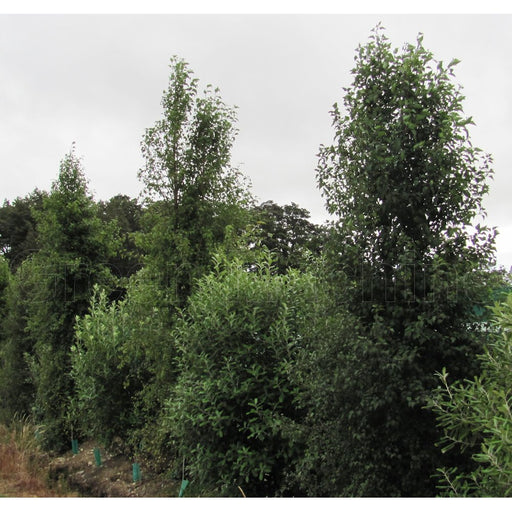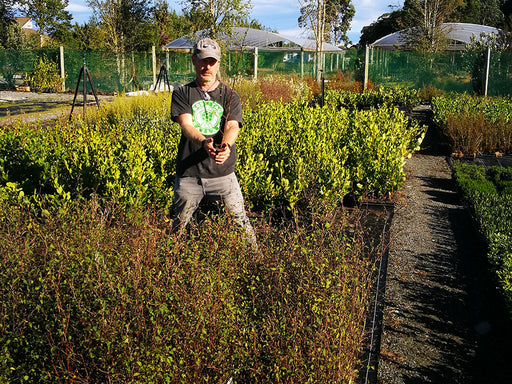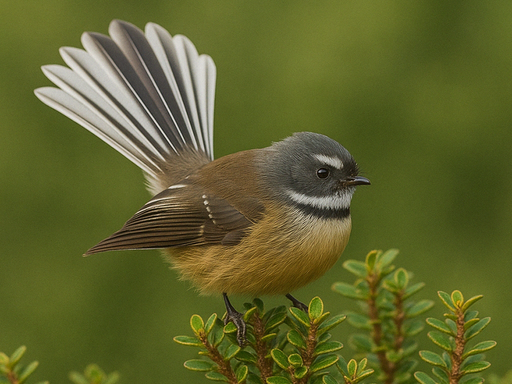Corokia Cotoneaster
Corokia cotoneaster (Corokia cotoneaster)
Common Names: Wire Netting Bush, Korokio
Family: Argophyllaceae
Origin: Native to New Zealand
Plant Type: Evergreen shrub
Overview:
Corokia cotoneaster is a distinctive and hardy New Zealand native shrub known for its intricate, zigzag branching pattern and small, silvery-grey leaves. Often referred to as the “wire netting bush,” its unique structure offers year-round architectural interest, especially when clipped into formal shapes. In spring, it produces small yellow star-like flowers, followed by bright red berries that attract birds. Tough, drought-tolerant, and wind-resistant, it’s well suited to hedging, coastal gardens, and native landscapes.
Key Features:
-
Foliage: Small, oval, grey-green leaves with a silvery underside; foliage often appears sparse but forms dense growth with age or clipping
-
Flowers/Fruit: Tiny, yellow, star-shaped flowers in spring, followed by ornamental red berries in autumn
-
Form & Habit: Naturally twiggy and irregular, but easily shaped into formal or cloud-pruned forms
-
Growth Rate: Slow to moderate
-
Cultural or Ecological Value: Important in native revegetation; berries provide food for birds; foliage used traditionally in Māori medicine
Mature Size:
| Attribute | Size |
|---|---|
| Height | 1.5 meters |
| Spread | 1 meter |
| Form | Dense, twiggy, upright or rounded |
Ideal Growing Conditions:
| Requirement | Detail |
|---|---|
| Light | Full sun to light shade |
| Water | Low to moderate; drought-tolerant once established |
| Soil | Well-drained; tolerates poor, dry, or rocky soils |
| pH Range | Neutral to slightly acidic |
| Frost Tolerance | Tolerates light to moderate frost once established |
Landscaping and Garden Uses:
-
Formal or informal hedging and topiary
-
Native and ecological gardens
-
Coastal and exposed sites
-
Feature shrub in structured designs
-
Wildlife gardens — berries attract birds
Care and Maintenance:
-
Pruning: Prune lightly to shape or clip into hedges; responds well to topiary and cloud pruning
-
Watering: Water during establishment; minimal watering once mature
-
Feeding: Generally low nutrient requirements; fertilize in spring if growth is slow
-
Pests and Diseases: Hardy and low-maintenance; rarely affected by pests
-
Additional Tips: For a tight hedge or topiary, prune regularly from an early stage
Fun Fact or Botanical Insight:
The name Corokia cotoneaster reflects the plant’s resemblance to Cotoneaster, though they are unrelated. Its intricate branches and silver-toned foliage make it a favorite in Japanese-style gardens and modern architectural landscapes.
Why Choose Corokia cotoneaster?
For those seeking a plant with structure, character, and resilience, Corokia cotoneaster is a top performer. Whether used as a clipped hedge, informal screen, or specimen shrub, it adds texture, contrast, and native integrity to any planting scheme.
Pot Size:
These are our large size in 9cm square pots.
Pot Size:
Standard Pot = 7cm Square
Large Pot = 9cm Square
Extra Large Pot = 1.5L Round
Use this guide to see how many plants of your selected pot size fit into a half or full carton.
Standard Pot = 25 plants per Carton
Large Pot= 10 plants per Carton
Extra Large Pot = 5 plants per Carton
Urban- $16.55 per Carton Rural- $23.85 per Carton
Standard Pot = 50 plants per Carton
Large Pot= 25 plants per Carton
Extra Large Pot = 10 plants per Carton
Urban- $16.55 per Carton Rural- $23.85 per Carton
Product Size:
The photo next to the ruler shows an example of the plant for sale (cm's) to give an indication of the size. Please note that the photo is for reference only; the size and appearance of the plant may vary.
Please Note:
Shipping charge applies. Available for immediate dispatch only, while stocks last.








